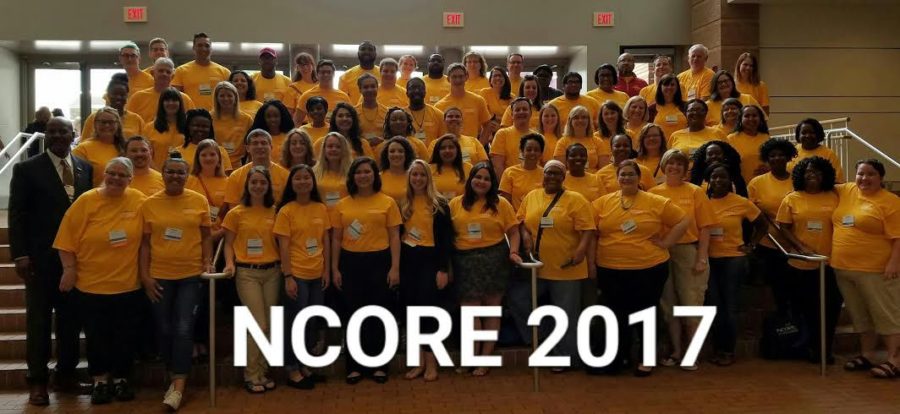Staff brings tools back from NCORE to empower students
By Maggie Curry, [email protected] @MCurryDaily
Iowa State University staff and students who attended the National Conference on Race and Ethnicity in higher education.
June 15, 2017
Japannah Kellogg, director of the Student Support Services Program, is one member of Iowa State’s staff who makes the trip to the National Conference on Race and Ethnicity (NCORE) every year. This year’s trip was the first week of June.
“I think you can have conversations around race but not that many people are comfortable having conversations around race,” Kellogg said.
Iowa State takes 20 students to the conference, and they can only attend once. Kellogg said each year is different because each group experiences it for the first time.
Part of the experience is learning about an ethnicity that is not their own. Some people questioned having students learn about someone else when they don’t even know themselves, but Kellogg said students say they learn about themselves by first learning about someones else’s struggles.
The point of attending the conference is to influence how leaders address race. For some students, it’s implemented in current leadership, such as a Community Adviser in the dorms. Some will use it later, as educators in their own classrooms.
“It is, and is not, about these 20 [students],” Kellogg said. “It’s about the 30,000 who can’t go.”
Iowa State also takes professional staff from across disciplines and departments to learn from the conversations at NCORE. Kellogg said it’s staff participation that will make a difference to Iowa State’s cultural climate.
“This is a thinktank of issues that happen on college campuses,” Kellogg said.
Kellogg said staff, from the new president down, has to be aware of the campus climate and that students are hurting. They come concerned about the safety of the families they leave behind.
Kellogg said some students may have been the only English speaker in their family and were the family translator, or their parents have stopped driving out of fear and now don’t have a way to get around. They come to campus to unpack those feelings and experiences.
“That’s real,” Kellogg said. “Staff has to recognize that and move our students from a place of trauma to a place of resiliency.”
Despite coming from different regions, Kellogg said many of the conversations around race in higher education are similar because of social media. The location of the conference also brings new awareness to those attending. One example Kellogg gave was San Francisco, which has a noticeable homeless population that isn’t seen in Iowa.
A college campus is where those conversations should be happening, Kellogg said.
“For the first time, students are more aware of their surroundings,” Kellogg said. “And more aware of where they came from.”
Iowa State is a predominantly white institution, and Kellogg said diversity comes from pockets. Kellogg works with first-generation and low income students, which is a mixed race group and is not just for racial minorities.
Iowa State gets some recognition at NCORE, particularly with the involvement of Tom Hill, former administrator, and starting a spirit day at the conference. They’re also known for ISCORE, the Iowa State Conference on Race and Ethnicity.
Kellogg thinks it’s the novelty of Iowa State. Other institutions attending see it as something to achieve to. Kellogg said they say, ‘if they’re doing it in Iowa, we should be doing better where we are.’
Because of that Kellogg has advised other institutions in starting their own campus conferences to talk about race. “A lot of people wanna have what we have,” Kellogg said. Kellogg tells them to capitalize on whatever they already have to start the conversation on their campus.
Kellogg plans to propose a way for Iowa State to expand the conversation as well. Kellogg called it “Beyond ISCORE.” One way to bring the conversation out the rest of the year, not just around the conference, would be to hold discussions after lecture program events.

















